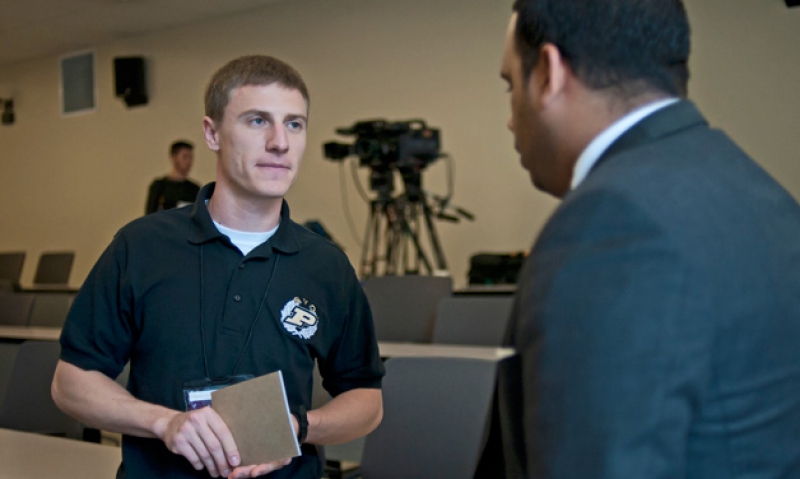
Feedback given to student veterans competing for grants from the Military Family Research Institute at Purdue University.
Last weekend, The American Legion sat on a panel of judges for a business plan competition at Purdue University in Lafayette, Ind., among student veterans organizations (SVOs) vying for a $2,000 grant from the Military Family Research Institute (MFRI). Steve Gonzalez, assistant director for the Legion’s Education and Employment Division, provided feedback to student veterans from four different SVOs on business pitches they gave, articulating their missions to assist student veterans on their campuses and the ways in which they would use the grant money.
Student veterans representing the SVO from Valparaiso University Law School won the grant with a presentation that focused on “delivering value” to student veterans at their school. This mission includes developing a repository of textbooks and study guides to help offset the high costs of these materials, providing tutors for student veterans at the school, and funding their annual 5k race which raises money for their chosen charity, Help a Vet Get a Pet.
Also in attendance were SVOs from Ball State University, Indiana University Southeast and Purdue.
The SVOs each gave 10-minute presentations which outlined their goals as an organization, how they are assisting veterans on campus and how the grant money would help them on both fronts. Feedback and questions were then presented to them by the panel of judges, which featured Gonzalez, Angela Xhakolli from Student Veterans of America and Jane Gerard, manager of change and communications at Kraft Foods.
The feedback the SVOs received from the expert judges can be as valuable to them as the grant money, said Jamie Simek, MFRI’s SVO coordinator.
“The feedback they get from the judges and being able to have somebody who is a professional, someone who does this regularly and can impart some of their wisdom, is really almost more valuable to them than the money,” Simek said.
In all, $6,800 in grants was awarded at the competition, which MFRI started in 2009 when it noticed that SVOs were forming but having trouble getting off the ground.
“The business plan competition was first held in 2009,” Simek said. “Basically, it was in response to some data collection and surveying we did that identified some gaps and concerns about student veterans organizations. We were seeing that they were organizing but having trouble launching.”
Among the things that SVOs focused on in their presentations over the weekend were charity events, aid they’d provide to student veterans at their schools and social functions they planned to hold with the money.
The student veterans from Purdue drew the attention of the judges with a policy they are in the process of getting enacted at their school, which would allow student veterans excused absences for classes missed due to service obligations. Their reasoning behind the policy: why shouldn’t student veterans receive excused absences for service commitments when athletes at the school are excused to miss class for obligations in their sports?
“(The policy) has passed both Purdue student governments,” said Ryan Keene, a junior at Purdue and a member of the school’s SVO. “Right now, it is on the faculty senate floor ready to get voted on. That’s the last step before it becomes official policy.... It’s been approved by all the students here, and it’s just waiting on the faculty vote to become official policy.”
Keene’s SVO has a relationship with a nearby Legion post in Lafayette. The post sponsors the SVO’s go-cart that it races in Purdue’s annual Grand Prix race, and a logo from the post is displayed on the car. In exchange for the sponsorship, the student veteran members of the race team joined the post.
“Funding (the race) can be quite expensive,” Keene said. “The parts and those kinds of things are not cheap. So The American Legion has been a great help by donating that money to us so we can compete and get our name out there. They don’t really ask a whole lot in return. They just want us to be members and be active. That’s what we do. We become members there. We support them, and they support us.”
Gonzalez said it’s important that posts develop similar relationships with student veterans at nearby colleges so that Legionnaires can provide much-needed support and mentorship to local student veterans.
“Many Legionnaires were in the same position when they came back from deployments,” Gonzalez said. “They know the stresses that can come with rejoining civilian society, providing for a family and trying to earn an education all at once. Legionnaires are in a great position to provide support and counsel for student veterans.”
- Education

